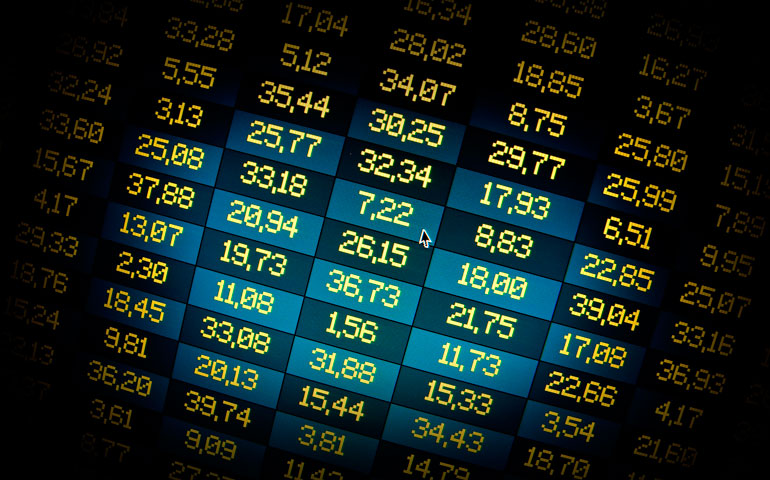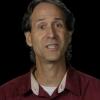
(Dreamstime)
Can we turn to Jesus for investment advice? No reason why not. Jesus, who lived peacefully among tax collectors, merchants and the wealthy, often speaks about money and finding treasure. Knowledgeable as he was about the professional lives of business managers, Jesus must have something interesting and relevant to say about smart money in our time. And yet, for whatever cultural-religious reason, when it comes to money matters we tend to keep divine counsel at bay.
I know that for myself, formerly both a Jesuit-in-training and investment adviser, I have looked to Jesus for comfort and counsel for just about any concern other than money-related.
Smart money is commonly identified with the "sure bet," the laying down of money on this or that investment vehicle with an expectation of receiving a high or fast return. This is especially true with high-yield bonds, but also with all manner of speculative trades, whether in global currencies or interest rates, gold or silver, oil or coffee, or any number of commodities. Such investments, however, tend not only to ignore social and environmental costs -- they overlook the social and environmental capital necessary for building a healthy economy and earning generous returns in the long run.
About seven years ago, for example, many investors considered subprime mortgage bonds smart money. We now know a different story. Eleven million mortgages are "underwater." Trillions of taxpayer dollars in bailouts and loan guarantees have flowed to the largest banks. Financial power is concentrated in too few hands, and with undercapitalized, excessively leveraged, non-transparent derivatives trading still rampant, the horror of collapse and "too big to fail" may likely happen again. Encouraging such mortgage-based investments was not good counsel.
Parable of the talents
In speaking with the scribes and Pharisees about the use of their finances in Matthew 23, Jesus demands attention to "the weightier matters of the law: justice and mercy and faith." With the parable of the talents (Matthew 25:14-30), wherein a slave master praises two of his slaves for doubling his money, Jesus goes further and affirms the values of initiative and risk-taking. As traditional interpretations hold, financial profiting in the parable refers to a soul's metaphorical profiting.
The parable of the talents is not about moneymaking, but rather ingenuity and stewardship of resources. It is about a kind of investing that arouses the joy of using our gifts and abilities to help the sick, poor and hungry, as well as families, communities and nations. At either the level of the individual or institution, assistance takes on many forms, such as volunteering or donations -- or commerce. I rather suspect that Jesus wills our building a more just economy in ways that we can, just as visionary entrepreneurs and owners take pride in seeing their employees use their time and labors effectively, bringing added value or profit to their business.
For the late Ray Anderson, this meant transforming the world's largest commercial carpeting and tile company, Interface Inc. Anderson was a religious man who in 1994 experienced an epiphany about the environmental legacy of the company he founded in 1973. His materials-intensive, extractive company could either continue to accumulate mountains of waste and toxic residue, or redesign itself completely to conform to the laws and contours of Earth's ecosystems. Anderson chose the latter and, in so doing, provided an extraordinary example of humility and leadership -- and success. Interface remains profitable on many levels, not just financial.
Notwithstanding exemplary for-profit enterprises like Interface, investments and profits must undergo the scrutiny of truth. This means, in part, questioning long-held assumptions about the meaning of growth while facing the manifold challenges of climate change, water shortages, and scarcities in oil, copper and other minerals. In doing as much, corporate leaders and investors better prepare themselves to discover smart money opportunities -- as in companies that move into the business of leasing perpetual services (i.e., refrigeration) rather than selling disposable products.
While a major conceptual shift is under way as to how sustainable investing and profit-making will be seen in the years ahead, numbers yet bear out the wisdom of trans-numerical, values-related investing. Averaging the stock prices of 400 environmentally and socially responsible (relatively speaking) corporations, the MSCI KLD Social 400 Index has outperformed the Standard & Poor's 500 index, its counterpart as an economic indicator, for the past 20 years.
Investing in imaginative and responsible business leads to superior financial returns in the long term. But the premise of smart money is based more on analysis of sustainability factors and the authority of Jesus' teaching about bearing good fruit, than on numbers that are too easily manipulated for the sake of appearances. Fortunately, as we shall see, there is a growing movement in the apparel industry and beyond to weave financial data through a loom of social and environmental knowledge.
The divided life
In 1986, the U.S. bishops issued a prophetic letter, "Economic Justice for All." Last year, the Vatican released the document "Vocation of the Business Leader," which reshines a light on money and business as tools for honoring (or defiling) the dignity of people and the health of the planet. Lead authors Cardinal Peter Turkson and Bishop Mario Toso, on the role of faith in tying commerce and spirituality, exhort: "Obstacles to serving the common good come in many forms -- corruption, absence of rule of law, tendencies towards greed, poor stewardship of resources -- but the most significant for a business leader on a personal level is leading a divided life" (authors' emphasis).
The idea of the divided life is critical to understanding why "smart money" and "doing the right thing" are so often seen in competing, dualistic terms. On a personal note, until graduate studies at Gonzaga University, my learning in the Catholic faith and my education about money seemed to develop on separate tracks. Though I had always been interested in stocks, it was in first learning about the art of social analysis that I began to explore the broader meaning of shareholder value.
Bridging faith and money and solving the problem of the divided life require paying attention to the sweep of history and science, humanity and culture, politics and other areas, since God is everywhere and teaches through all things.
Such "slow knowledge," richly discussed in David W. Orr's book The Nature of Design: Ecology, Culture, And Human Intention, is ultimately concerned with the work of the "wise steward," or the investor who is mindful of Christ, the lord of all creation. He or she builds on principles of dignity and justice, partners with the Earth, and helps bring goods and services to market.
When it comes to money, of course, we all have our blind spots. Greed has corrupted more than its fair share of banking and investing practices. The financial industry has been caught overleveraging billions in bad investments. Even after the chastening of 2008 and the exposure of the U.S. economy to massive systemic risk, little has changed in the "easy money" outlook of most financial institutions. Investors and trustees have had a role in our financial demise, too. People are slow to acknowledge their participation in deceit, and willingness to entrust hard-earned money, no questions asked, to "experts." If we can no longer surrender our unconditional trust to big-name financial firms, if ever we could, to whom or what can we look to help guide our finances?
Whole system finance
I submit we can turn with confidence to citizens and businesspersons who are as passionate about building community and revering the Earth as they are about making money, whether or not they work at Goldman Sachs or Citi. Like Ray Anderson, they are not leading a divided life. Among them are three top executives who dare to imagine the following question: "What if we could get to the point where the lowest-priced T-shirt was also the one doing the least harm to the planet and society?"
In October 2011, Yvon Chouinard and Rick Ridgeway of Patagonia and Jib Ellison of BluSkye co-authored a superb article in the Harvard Business Review, "The Sustainable Economy." They describe the convergence and integration of whole-cost accounting, sustainable investing, and "value chain indexes," positioned to accelerate the growth of eco-intelligent business and more deeply enlightened consumer behavior. Attention to this systemic transformation, and action on its behalf, is perhaps the most prudent step for any forward-thinking investor or trustee.
First, whole-cost accounting ascribes financial value to the overlooked wealth of nature's services -- negatively, to the depletion and degradation of ecosystems such as rain forests, or, positively, to industrial restoration of water supplies and other natural resources. Treating nature as infinite and free, especially with respect to the burning of fossil fuels, has proven an epic historic failure in the science of economics and the practice of business. But this is changing.
The World Bank has placed a value on the planet's ecosystem resources at $44 trillion. PricewaterhouseCoopers, a major accounting firm, has joined the Nature Conservancy and Conservation International to develop numerically sound valuation methods for the flow or loss of ecosystems. For their part, corporate leaders like Dow Chemical and the French PPR group (which owns Puma, Gucci and Yves Saint Laurent) are both integrating full-cost accounting into their bottom-line balance sheets.
The second movement, sustainable investing, is a key ally to whole-cost accounting. As Chouinard and the others write, smart investors look to uncover the full range of costs and opportunities with their money. They do not want to be left in the dark as more comprehensive income charts appear and, consequently, as industry-wide best practices evolve. Nowhere is corporate sustainability research and analysis better developed than through the work of Ceres, the Coalition for Environmentally Responsible Economies. According to Ceres, climate risk is the top financial concern to a growing number of institutional investors, as well as companies in insurance, construction, travel and other areas.
Not only does smart money understand the import of full-cost accounting and invests accordingly, it also supports the third movement, value chain indexes, or VCI. These are overall ratings standards for products and brands that evaluate and quantify a wide variety of relevant environmental and social business factors, and thereby influence entire supply chains. Such factors include restorative water use and organically grown cotton or other fibers. Already, GoodGuide ratings have been applied to more than 100,000 products in 600 categories, and the Sustainable Apparel Coalition, employing sustainability scores, has been launched. The coalition includes many firms like Target, Timberland and Patagonia. Comprehensive VCI labels will be made accessible to iPhone apps, drawing on user-friendly information provided by toxicologists, water and soil experts, nutritionists, human rights and fair trade leaders, and more.
Such resiliency in economic development inspires a collaborative effort among many professionals, including scientists, engineers, business owners, religious leaders, and policymakers. Financial analysts are needed too, but until financial numbers are aligned with social and environmental performance, the true underpinnings of financial gain, their say is limited and often misleading. The merging of social and environmental values with industry and finance -- in numerical terms -- will make it easier for financial analysts to get it right.
As financial, social and environmental wealth are generated, divisive ideas about making money and doing good will peel away. Defined most pointedly as Christ-centered investing, smart money can only express financial health, planetary respect, strong community and spiritual transformation. Seeing all in all fruits of the local and global economies, Jesus will surely say -- to investors, Wall Street analysts, legislators and all of us -- "Well done, good and faithful servants."
[Doug Demeo is a fellow with GreenFaith and formerly worked as a socially responsible investment advisor and an economic development aide to Congressman Barney Frank in Newton, Mass. He lives in Trenton, N.J.]




